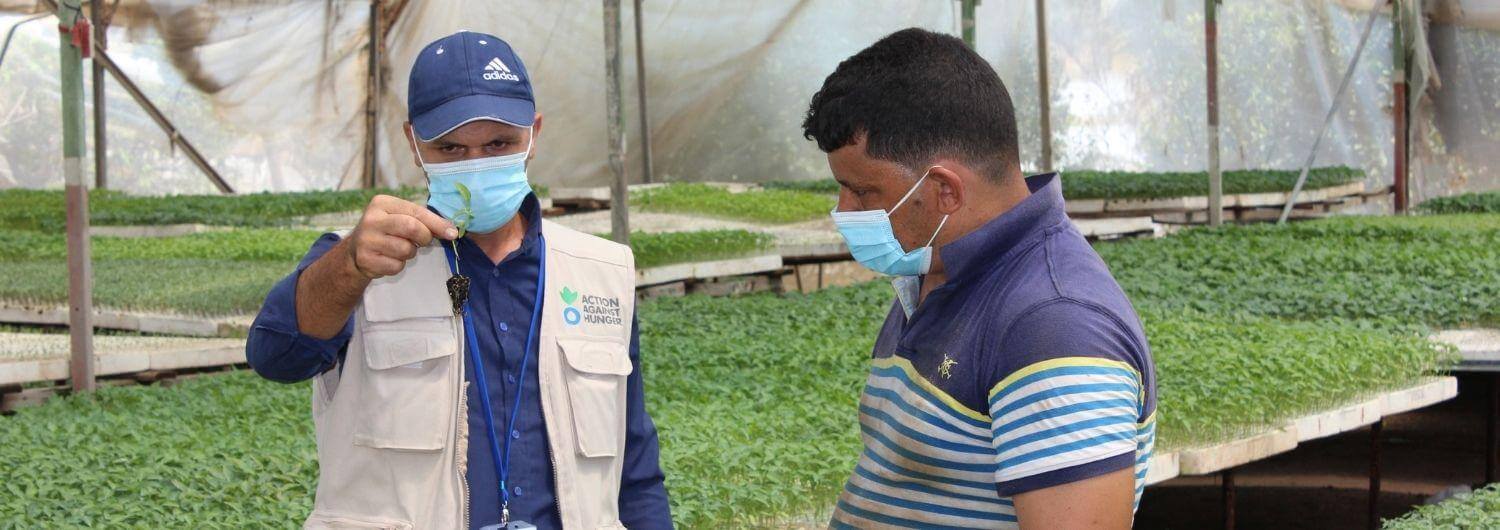Stories
Gaza farmers, an example of adaptability to the challenge of the climate crisis

Un agricultor de Gaza estudiando técnicas para adaptar sus cultivos al cambio climático
In recent years, farmers in the Gaza Strip have suffered from climate change consequences, such as the increase of water salinity directly affecting their farming activities. Increased water salinity is due to 3 main causes: the overuse of the groundwater present in the aquifer combined with sea water infiltration due to the erosion in the land, and pollution due to lack of waste management resources. The effects of climate change impact not only the seasonality of farming activities, but also the choice of types of cultivation and the needed inputs, while managing to sustain livelihoods in an economy under blockade. Smallholder farmers try to adapt to meet these challenges and to continue farming and generate income for their families.
BACKGROUND AND OBSERVED CHANGES
In 2021, AAH has been supporting 90 small holder farmers through two main interventions answering two needs: access to production inputs and technical expertise. AAH provides cash for livelihoods allowing them to purchase the needed inputs to rehabilitate their production levels following damages and technical follow up through individual and grouped field visits. The technical support enables farmers to identify quality inputs available on the markets, to uptake water saving techniques, including the reduction of chemical inputs usage to preserve soil and water quality.
Since April 2021, through one intervention AAH has been supporting Khaled and Mohammed, two smallholder farmers in Al Mawasi locality, in Khan Yunis governorate. AAH agronomist discussed with them the impact of climate change on their farming activities, as both reported similar challenges and mitigation practices.
Khaled and Mohammed have been farmers for 19 years and are relying on agriculture as their main source of livelihoods. Both are now preparing their land for planting tomatoes, one of the most common crops in Gaza. Mohammed mainly farms under his greenhouse.
Khaled has noticed the effects of climate change for the past five years, including rise of temperature in the summer, the storms and extreme weather conditions in the winter, and most importantly, the increase of salinity of the water in the aquifer.
High summer temperatures and the increase of humidity directly affect the development and production cycle of the crops. Mohammed noticed that higher temperatures were causing lower production and shortens the life cycle of the crop, reducing plant growth and increasing the spread of moisture-related diseases. Especially this summer, he observed that plants lost their flowers, dramatically reducing the final production amounts.
In winter, production suffers from large intermittent amounts of rain, while farmers are facing difficulties to store water that will enable them to irrigate their crops for each season’s needs. Storms and extreme cold cause direct damages to the infrastructure and the growth of crops as well, reducing production quantities during the second season also.
every year, khaled and mohammed observe an increase in the salinity levels of the groundwater, which is one of the most important challenges affecting the crops by shortening plant life, reducing production, increasing diseases vulnerability, and increasing the use of fertilizer. These challenges increase costs of production, decreases the soil fertility, and limits the selection of crops that can be cultivated, according to their salt-tolerance.
 Mohammed in his greenhouse, Khan Yunis, August 2021
Mohammed in his greenhouse, Khan Yunis, August 2021
MITIGATION MEASURES
Khaled’s family owns a nursery where they are trying to diversify plant varieties and identify varieties that are resistant to the challenges induced by climate change. Khaled shared: “Climate change has made us face great challenges and we have begun to search for solutions with the available possibilities”. As the Gaza Strip has been under a blockade for 14 years now, the needed inputs and materials are not always available or are prohibited, considerably narrowing the opportunities for mitigation practices.
Khaled and Mohammed mentioned that they are trying to adapt to rising temperatures through different tactics, by covering the vegetables crops with shading nets, postponing planting dates, and searching for the right types of crops for each season, tolerating cold and/or humidity. The maintenance of Mohammed’s greenhouse is essential to avoid the devastating effects of cold temperatures.
To challenge water salinity issues, Khaled used to harvest and store rainwater in agricultural ponds to irrigate crops, by mixing it with saline water to dilute it. Sometimes he buys water from a well more than 1 km away to mix it with saline water to improve the quality of the irrigation water, slightly decreasing use of fertilizer and the damage to soil quality. Mohammed checks the salinity of his land with an electrical conductivity (EC) tool. He doesn’t have rainwater harvesting ponds due to the high installation costs. Accordingly, he purchases the water from a well, 2 km away and mixes it with water of his underground tank to improve the water quality.
Khaled and Mohammed think that the coming years will be difficult for farmers, and they both call for action by the government by developing a strategy to combat climate change and identify alternative solutions to support smallholder farmers.
JOIN US
Donate now
Your donation will reach those who most need it
Become a member
Join the generation that can bring an end to hunger
Donate via SMS
send HAMBRE to:
- 28010(1.2€)
- 38010(6€)
- 38012(3€)
Full donation to our projects. Valid for Movistar, Vodafone, Orange and Yoigo